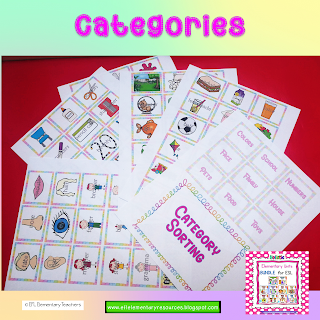Find a themed game board in each unit for teaching elementary English language learners. This kind of games are very engaging and interactive for your students. You can adapt all the games to suit your players to encourage participation, right here: https://www.teacherspayteachers.com/Product/Board-games-for-Elementary-English-Language-Learners-11333780
Is this something that
you would include in your lesson plan? Maybe not? Would like to? Well, read and see
if you are up for it.
Take a look at the engaging ESL board games for elementary English — fun printable games, classroom activities, and speaking prompts to boost vocabulary and fluency for young learners.
Use
the board games as a review of the new vocabulary of the unit. It is a
fun repetition of the words. The markers are also included with each board
game. So, just grab the dice. Each space has a color. Players have to move
along the path. When they land on a space, they have to say the name of that color
and show an item in that color.
Create
a motivated and positive classroom atmosphere, where students know that there
will be an enjoyable learning game to wrap up the class. Players will
describe the colors of the space they landed on besides the number: It’s an orange twelve.
Games
help with memory skills that are crucial for English language retention.
That’s another reason for printing and having the games ready to play. The objective
of the game is to navigate through the various spaces on the game board,
learning and practicing vocabulary related to different facial features.
Board
games are a very informal way of assessing your student’s language proficiency
in communicating. Are they using the language enough? Are they struggling to
move along the board?
Players will
navigate through the various spaces on the game board, answering questions
related to family members with the cards in the game, light or dark green.
Another House unit activiti with a board game.Players will
move their family members game pieces by correctly identifying the rooms of the
house. The first player to reach the finish line wins.
Add
a twist to the pet unit board game, but it works with any other theme. Players
have to describe the pet they landed on in order to take that pet into
their pet shop.
Students
can do more than just identifying the word but saying a phrase or complete
sentence in order to get the food card. The more food cards a player has,
he/she is the winner.
Players move
their game pieces around the Toyland game board, by completing challenges such
as miming how to play with the toys they land on.
All
the board games are included in each unit and in the Bundle, right here: https://www.teacherspayteachers.com/Product/Elementary-English-Language-learners-teaching-Units-Starters-BUNDLE-11215540


















































